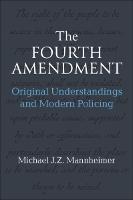The Fourth Amendment
External Review of Whole Manuscript
Original Understandings and Modern Policing
Abstract
Police are required to obey the law. While that seems obvious, courts have lost track of that requirement due to misinterpreting the two constitutional provisions governing police conduct: the Fourth and Fourteenth Amendments. The Fourth Amendment forbids ""unreasonable searches and seizures"" and is the source of most constitutional constraints on policing. Although that provision technically applies only to the federal government, the Fourteenth Amendment, ratified in the wake of the Civil War, has been deemed to apply the Fourth Amendment to the States.
This book contends that the courts’ misinterpretation of these provisions has led them to hold federal and state law enforcement mistakenly to the same constitutional standards. The Fourth Amendment was originally understood as a federalism, or “states’ rights,” provision that, in effect, required federal agents to adhere to state law when searching or seizing. Thus, applying the same constraint to the States is impossible. Instead, the Fourteenth Amendment was originally understood in part as requiring that state officials (1) adhere to state law, (2) not discriminate, and (3) not be granted excessive discretion by legislators. These principles should guide judicial review of modern policing. Instead, constitutional constraints on policing are too strict and too forgiving at the same time. In this book, Michael J.Z. Mannheimer calls for a reimagination of what modern policing could look like based on the original understandings of the Fourth and Fourteenth Amendments.
Keywords
Fourth Amendment, Fourteenth Amendment, Policing, Democratic Policing, Search and Seizure, Originalist, Original Understanding, Original Public Meaning, Reconstruction, Anti-Federalists, Writs of Assistance, Privileges or Immunities Clause, John Bingham, Jacob Howard, Incorporation, Bill of Rights, Reasonable Expectation of Privacy, Common Law, Wilkesite Cases, Trespass, Melancton Smith, Patrick Henry, George Mason, Black Codes, Vagrancy, Supreme Court, Search Warrants, Townshend Act, Militia Act of 1792, Judiciary Act of 1789, Federalism, States Rights, Justice of the Peace Manuals, Convict Leasing, Stop and Frisk, Terry Stops, Traffic Stops, Nondelegation, Special Needs Doctrine, Warrant-Preference Rule, Probable Cause, Sobriety Checkpoints, Implied-Consent Laws, Reverse Incorporation, Automobile Inventory Searches, Excessive Force, Police ViolenceDOI
10.3998/mpub.12158575ISBN
9780472076338, 9780472056330, 9780472903719Publisher
University of Michigan PressPublisher website
https://www.press.umich.edu/Publication date and place
2023Classification
Jurisprudence and general issues
Constitutional and administrative law: general
Human rights, civil rights
Local government law


 Download
Download